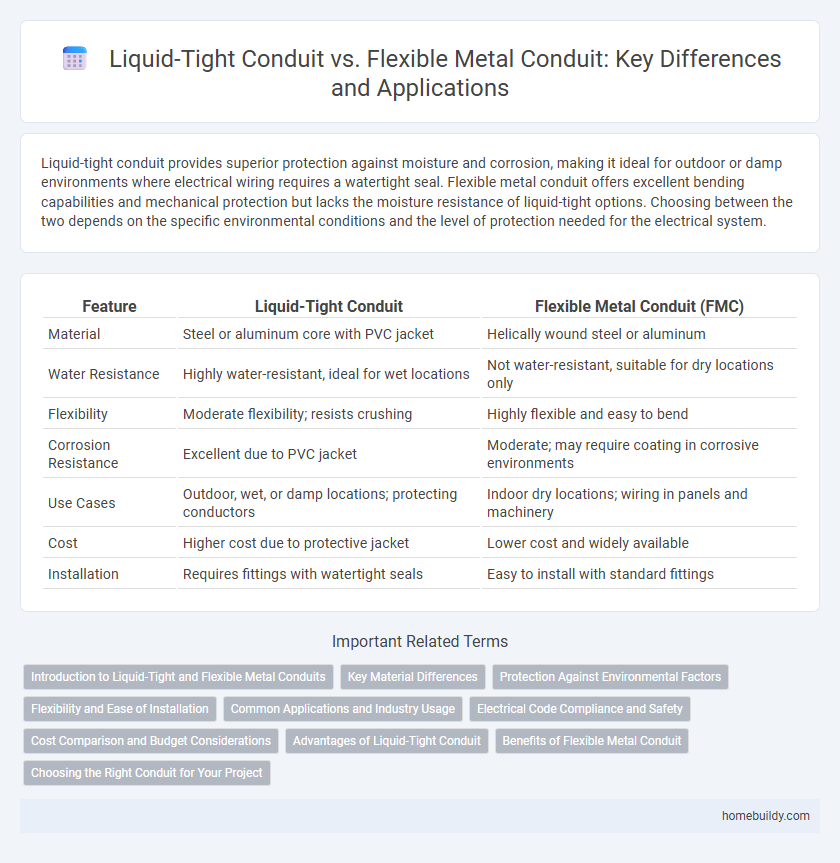Liquid-tight conduit provides superior protection against moisture and corrosion, making it ideal for outdoor or damp environments where electrical wiring requires a watertight seal. Flexible metal conduit offers excellent bending capabilities and mechanical protection but lacks the moisture resistance of liquid-tight options. Choosing between the two depends on the specific environmental conditions and the level of protection needed for the electrical system.
Table of Comparison
| Feature | Liquid-Tight Conduit | Flexible Metal Conduit (FMC) |
|---|---|---|
| Material | Steel or aluminum core with PVC jacket | Helically wound steel or aluminum |
| Water Resistance | Highly water-resistant, ideal for wet locations | Not water-resistant, suitable for dry locations only |
| Flexibility | Moderate flexibility; resists crushing | Highly flexible and easy to bend |
| Corrosion Resistance | Excellent due to PVC jacket | Moderate; may require coating in corrosive environments |
| Use Cases | Outdoor, wet, or damp locations; protecting conductors | Indoor dry locations; wiring in panels and machinery |
| Cost | Higher cost due to protective jacket | Lower cost and widely available |
| Installation | Requires fittings with watertight seals | Easy to install with standard fittings |
Introduction to Liquid-Tight and Flexible Metal Conduits
Liquid-tight conduit provides superior protection against moisture and corrosive environments, making it ideal for outdoor and wet location applications. Flexible metal conduit offers excellent mechanical protection and bending capabilities, suited for indoor installations requiring easy routing and vibration resistance. Both conduits comply with National Electrical Code (NEC) standards for conduit use but differ in material composition and suitability based on environmental conditions.
Key Material Differences
Liquid-tight conduit is made from a plastic jacket with an internal metal core, providing superior resistance to moisture, chemicals, and corrosion compared to flexible metal conduit, which consists solely of a helically wound metal strip allowing high flexibility but lacking water resistance. The plastic outer layer of liquid-tight conduit enhances durability in wet and outdoor environments, making it ideal for protecting electrical wiring in harsh conditions. Flexible metal conduit offers excellent mechanical protection and flexibility for indoor installations but requires additional sealing to achieve moisture resistance.
Protection Against Environmental Factors
Liquid-tight conduit offers superior protection against moisture, chemicals, and UV exposure due to its non-metallic, plastic jacket that prevents water ingress and corrosion. Flexible metal conduit provides good mechanical protection and flexibility but requires additional sealing to be resistant against water and environmental contaminants. For applications in wet or corrosive environments, liquid-tight conduit ensures enhanced durability and safety compared to standard flexible metal conduit.
Flexibility and Ease of Installation
Liquid-tight conduit offers superior flexibility due to its non-metallic, pliable outer jacket, enabling easier maneuvering around tight corners and complex routing paths. Flexible metal conduit, while durable and providing excellent protection against physical damage and electromagnetic interference, tends to be stiffer and harder to bend, which can complicate installations in confined spaces. Liquid-tight conduit's lighter weight and corrosion-resistant properties also contribute to faster and less labor-intensive installation processes in wet or outdoor environments.
Common Applications and Industry Usage
Liquid-tight conduit is commonly used in outdoor and wet environments, such as chemical plants, marine facilities, and industrial machinery, where moisture protection is critical. Flexible metal conduit is favored in commercial buildings, HVAC systems, and electrical wiring installations that require flexibility and mechanical protection in dry indoor environments. Both conduits comply with NEC standards but serve distinct roles based on the exposure to elements and mechanical stress.
Electrical Code Compliance and Safety
Liquid-tight conduit (LFMC) complies with NEC Article 356, providing excellent protection against moisture, chemicals, and corrosion, making it ideal for outdoor and wet locations. Flexible metal conduit (FMC), governed by NEC Article 348, offers good flexibility but lacks inherent liquid-tight properties, requiring additional sealing in damp environments to maintain code compliance. Prioritizing safety, LFMC ensures superior resistance to environmental hazards, reducing the risk of electrical faults and enhancing system longevity in harsh conditions.
Cost Comparison and Budget Considerations
Liquid-tight conduit typically costs more upfront compared to flexible metal conduit due to its durable, weather-resistant materials designed for outdoor and wet environments. Flexible metal conduit offers a more budget-friendly option for indoor applications, providing sufficient protection at a lower price point. When deciding between the two, project-specific requirements and long-term maintenance expenses should be factored into budget considerations to ensure cost efficiency.
Advantages of Liquid-Tight Conduit
Liquid-tight conduit offers superior protection against moisture, chemicals, and corrosion, making it ideal for outdoor and wet location installations. Its flexible, yet robust construction allows easy bending and routing in tight spaces while maintaining a strong seal against environmental elements. This conduit type enhances durability and safety by preventing water ingress, reducing the risk of electrical failures or hazards in harsh conditions.
Benefits of Flexible Metal Conduit
Flexible metal conduit (FMC) offers superior durability and protection against physical damage compared to liquid-tight conduit, making it ideal for environments with mechanical stress. FMC provides excellent electrical grounding and EMI protection due to its continuous metallic construction. Its flexibility simplifies installation around obstacles and tight spaces, reducing labor time and costs in complex electrical systems.
Choosing the Right Conduit for Your Project
Liquid-tight conduit offers superior protection against moisture, making it ideal for outdoor or wet locations, while flexible metal conduit provides excellent mechanical protection and flexibility for indoor installations. Selecting the right conduit depends on environmental exposure, installation complexity, and compliance with local electrical codes. Evaluate factors such as corrosion resistance, ease of installation, and durability to ensure optimal performance and safety in your electrical project.
Liquid-tight conduit vs Flexible metal conduit Infographic

 homebuildy.com
homebuildy.com